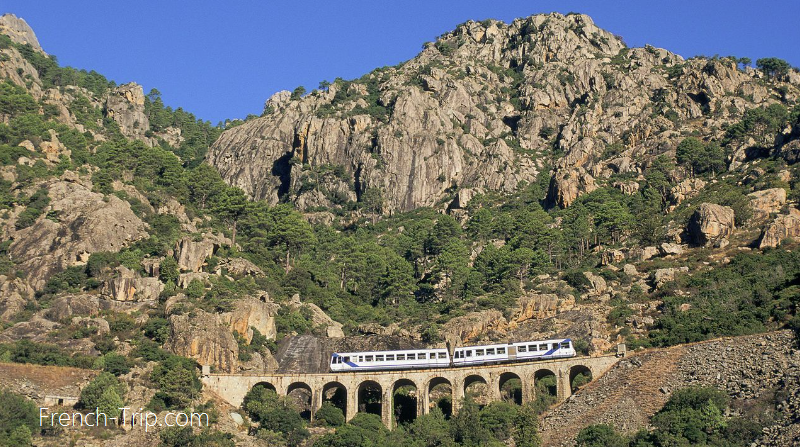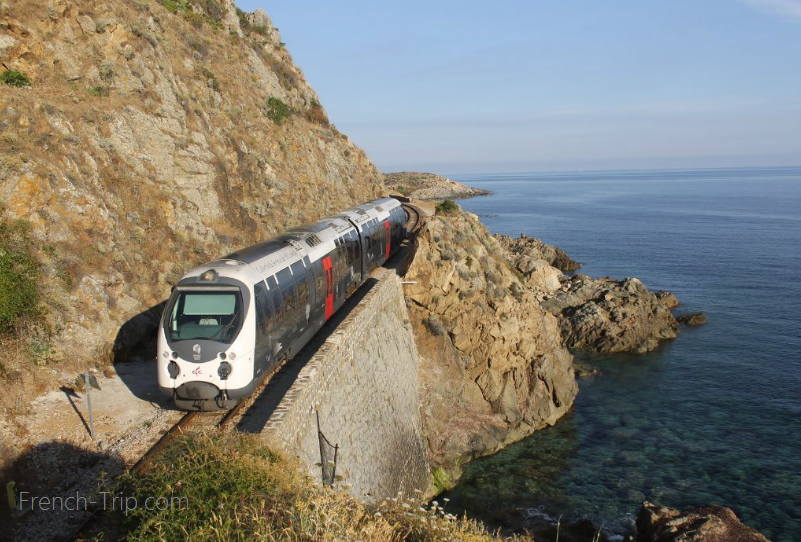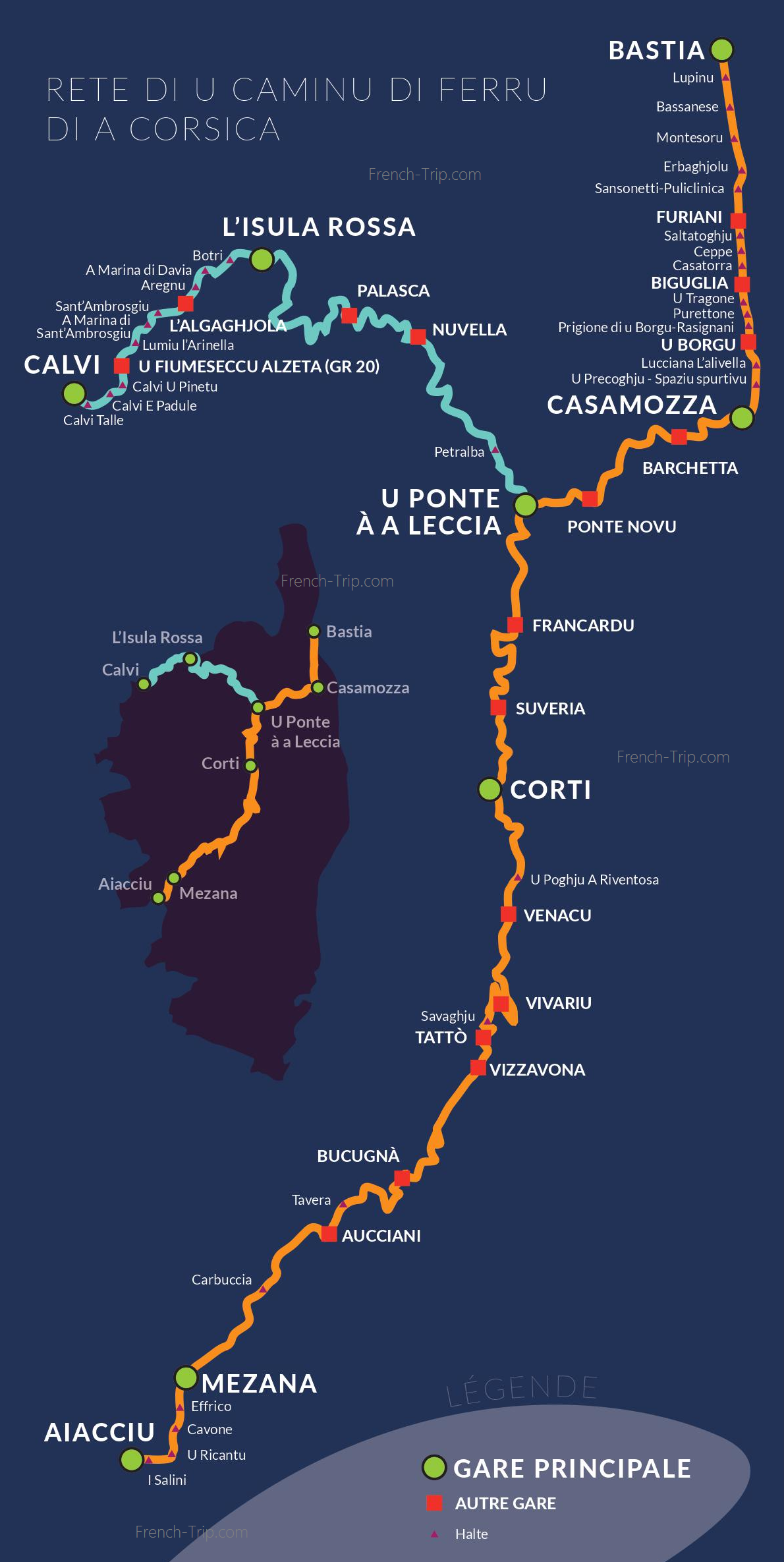Trains in Corsica

Trains in Corsica, operated by Chemins de Fer de la Corse (CFC), are a metre-gauge railway network that connects key towns including Ajaccio, Bastia, and Calvi. The main line runs approximately 158 kilometers from Bastia in the northeast to Ajaccio in the southwest, with a scenic journey that takes about three hours and includes notable stops at Corte and Vizzavona. A subsidiary line branches off at Ponte-Leccia, leading to Île-Rousse and Calvi, making it a popular option for tourists looking to explore the island’s beautiful landscapes.
The railway is known for its stunning views as it traverses mountainous terrain, offering travelers a unique perspective of Corsica’s natural beauty. While the service frequency varies — up to five trains per day during peak seasons — it’s advisable to check schedules in advance, especially during off-peak times.
Tickets can be purchased at stations, and the network provides an essential means of transport for both locals and visitors seeking to navigate the island without a car. More information on timetables and fares can be found on the CFC website.
*prices and conditions are updated as of 2024
History of Trains in Corsica
In 1877, the decision was made to construct a metre-gauge railway in Corsica, starting with the Bastia–Ajaccio route. For a long time, its completion was considered impossible due to the challenging terrain. However, in 1888, the sections between Bastia–Corte and Ajaccio–Bocognano were opened. The remaining parts were gradually completed until the railway was fully operational in 1894.
By the outbreak of World War I, the Corsican network spanned 295 kilometers of track. The network was further expanded at the onset of World War II, and a western line connecting Porto-Vecchio was opened. Unfortunately, World War II destroyed much of the infrastructure and halted further expansion. Afterward, Chemins de fer de la Corse struggled to survive for many years. In 1955, efforts to prevent the closure of the La Balagne line (from Ponte-Leccia to Calvi) mobilized both railway workers and the Corsican population. Public support fought to keep the remaining 232 kilometers of track open in 1959 and again in 1972.
The sequence of private operators managing the railway ended in 1983. Decentralization laws allowed Corsica to manage its own regional transport systems. The SNCF took over the network’s operation, and in September 2001, Corsican authorities handed the responsibility of running the railway as a public service to the SNCF. Working together, the state, Corsican authorities, and the SNCF jointly developed a modernization plan aimed at securing the future of rail transport. Over €110 million was invested in improvements, new carriages were purchased, and the existing fleet was upgraded. These new carriages reduced travel time (Bastia–Ajaccio in 2 hours and 30 minutes) and increased service frequency.

Trains in Corsica
- Trains in Corsica are slowly updated to the new modern versions even with panoramic windows. But some very old trains are still in use.
- Not all stations are suitable for people with reduced mobility of with a stroller, but all main stations are already modified to suit this requirements.
- All intrmediate stations are considered as optional stop. You have to inform a driver in order to stop by pressing a button in the train or at the station.
Optional stops
The system of request stops allows for more efficient operation, as trains can skip stops where no passengers need to board or alight, potentially reducing overall journey times. These stops are marked with a small cross (†) in front of the stop times on the timetables.
To request a stop:
- If you’re at the station and want to board: You should make yourself visible on the platform as the train approaches. Wave your arm clearly to signal the driver that you want to board.
- If you’re on the train and want to get off: You need to inform the conductor or use the stop request button (if available) well in advance of your desired stop.
Remember, it’s always a good idea to arrive at the station a bit early if you’re planning to board at a request stop, to ensure you don’t miss the train. If you’re unsure about the procedure, you can always ask for clarification from the station staff or the train conductor.
Rail routes
Three main lines of trains operating in Corsica:
Additional 3 lines provide rail service to suburbs of Ajaccio, Balagne region and Bastia.
- Bastia – Casamozza
- Calvi – Ile Rousse
- Ajaccio – Mezzana
Rail map of Corsica:
*Names are written in corsican language

Train tickets in Corsica
Tickets can be purchased at stations. There are options to save significant money:
Pass Liberte – € 50
- free travel across the entire network, for the sum of €50
- Valid for 7 consecutive days
- This pass is personal and non-transferable
- In case of loss or theft, no duplicate or refund can be made
- Buy Pass Liberte online
Children
- 50% off full price for children aged 4 to 12
- Free travel for children under 4 years old
- Reduced rate applied upon presentation of proof
Fares
Single tickets
If you are planning to use train in Corsica only few times, single ticket might be a better option. Price is deternined by zones as if with buses.
- 1 section — € 2. Example: Ajaccio / Mezzana, Calvi / U Fiumeseccu Alzeta, Bastia / Biguglia
- 2 section — € 4. Example: Calvi / Marine de Davia, Ile Rousse / U Fiumeseccu Alzeta, Bastia / Casamozza
- 3 section — € 6. Example: Calvi / Ile Rousse
Examples of ticket fares:
- Ajaccio – Calvi: €25.10
- Ajaccio – Corte: €11.50
- Ajaccio – Ile Rousse: €22.20
- Bastia – Ajaccio: €21.60
- Bastia – Calvi: €16.40
- Bastia – Corte: €10.10
- Corte – Calvi: €13.70
- Corté – Vizzavona: €4.50
- Corte – Ile Rousse: €10.80
Full list of fares for trains in Corsica
More convenient unofficial version
Train Timetable
Timetable of trains in France is made very complicate, depending on weekday, seasons and school holidays. If you check timtable, pay attention to what is written at the top of departure time:
- Sauf samedi, dimanche et Jours fériés means that trains are operating only on working days.
- Sauf dimanche et Jours fériés = Except Sundays and public holidays
- Tous les jours = every day
Some stations might be even not served during specific period of time or can be served only by signal to the driver. For example:
- Arrêt non desservi le vendredi, le dimanche et les jours fériés durant la période scolaire – Stop not served on Fridays, Sundays and public holidays during school term time
- Arrêt non desservi le vendredi durant la période scolaire – Stop not served on Fridays during school term
- Arrêt facultatif – Faire signe au conducteur pour demander l’arrêt – Optional Stop – Signal the driver to request a stop
You can check actual timetable on the official website.
More convenient unofficial version
Useful links:
- Transportation in Corsica
- Buses in Corsica
- Transport in France
- Regional trains in France
- High-speed TGV trains in France
Archives
Calendar
| M | T | W | T | F | S | S |
|---|---|---|---|---|---|---|
| 1 | ||||||
| 2 | 3 | 4 | 5 | 6 | 7 | 8 |
| 9 | 10 | 11 | 12 | 13 | 14 | 15 |
| 16 | 17 | 18 | 19 | 20 | 21 | 22 |
| 23 | 24 | 25 | 26 | 27 | 28 | |